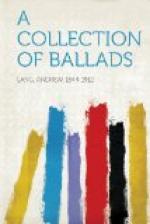THE BATTLE OF OTTERBURN
From The Border Minstrelsy, Sir Walter Scott’s latest edition of 1833: the copy in the edition of 1802 is less complete. The gentle and joyous passage of arms here recorded, took place in August 1388. We have an admirable account of Otterburn fight from Froissart, who revels in a gallant encounter, fairly fought out hand to hand, with no intervention of archery or artillery, and for no wretched practical purpose. In such a combat the Scots, never renowned for success at long bowls, and led by a Douglas, were likely to prove victorious, even against long odds, and when taken by surprise.
Choosing an advantage in the discordant days of Richard ii., the Scots mustered a very large force near Jedburgh, merely to break lances on English ground, and take loot. Learning that, as they advanced by the Carlisle route, the English intended to invade Scotland by Berwick and the east coast, the Scots sent three or four hundred men-at-arms, with a few thousand mounted archers and pikemen, who should harry Northumberland to the walls of Newcastle. These were led by James, Earl of Douglas, March, and Murray. In a fight at Newcastle, Douglas took Harry Percy’s pennon, which Hotspur vowed to recover. The retreat began, but the Scots waited at Otterburn, partly to besiege the castle, partly to abide Hotspur’s challenge. He made his attack at moonlight, with overwhelming odds, but was hampered by a marsh, and incommoded by a flank attach of the Scots. Then it came to who would pound longest, with axe and sword. Douglas cut his way through the English, axe in hand, and was overthrown, but his men protected his body. The Sinclairs and Lindsay raised his banner, with his cry; March and Dunbar came up; Hotspur was taken by Montgomery, and the English were routed with heavy loss. Douglas was buried in Melrose Abbey; very many years later the English defiled his grave, but were punished at Ancram Moor. There is an English poem on the fight of “about 1550”; it has many analogies with our Scottish version, and, doubtless, ours descends from a ballad almost contemporary. The ballad was a great favourite of Scott’s. In a severe illness, thinking of Lockhart, not yet his son-in-law, he quoted—
“My wound is deep, I fain would sleep, Take thou the vanguard of the three.”
Mr. Child thinks the command to
“yield to the bracken-bush”
unmartial. This does not seem a strong objection, in Froissart’s time. It is explained in an oral fragment—
“For there lies aneth yon bracken-bush Wha aft has conquered mair than thee.”
Mr. Child also thinks that the “dreamy dream” may be copied from Hume of Godscroft. It is at least as probable that Godscroft borrowed from the ballad which he cites. The embroidered gauntlet of the Percy is in the possession of Douglas of Cavers to this day.




